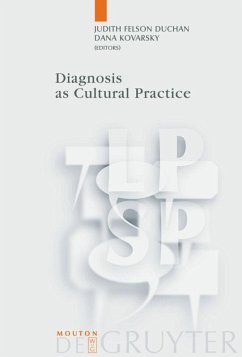Diagnosis isn't what it seems. It is usually treated as a label, arrived at by professionals, to explain a problem and to point to treatment. This view of diagnosis fits 'the medical model'. Authors in this book view diagnosis as a process, not a label. Diagnosis involves a negotiation of power relationships as well as of professional accountability. The chapters reveal how today's professionals and non-professionals use diagnosis to explain medical problems and also to explore how a diagnosis affects the identities of those diagnosed. In addition, some chapters show how diagnostic reasoning occurs in unexpected contexts such as when writing letters of recommendation and talking about communication. Together, a diverse array of authors from various backgrounds, highlight the many ways that diagnosis is deeply rooted in today's culture.
This book is about the doing and experiencing of diagnosis in everyday life. Diagnoses are revealed as interactive negotiations rather than as the assigning of diagnostic labels. The authors demonstrate, through detailed discourse analyses, how the diagnostic process depends on power and accountability as expressed through the talk of those engaged in the diagnostic process. The authors also show that diagnostic decisions are not only made by professional experts trained in the art and science of diagnosis, but they can also be made by anyone trying to figure out the nature of everyday problems. Finally, diagnostic reasoning is found to extend beyond typical diagnostic situations, occurring in unexpected places such as written letters of recommendation and talk about the nature of communication. Together, the chapters in this book demonstrate how diagnosis is a communication practice deeply rooted in our culture. The book is interdisciplinary and unusually broad in its focus.The authors come from different experiential scholarly backgrounds. Each of them takes a different look at the impact and nature of the diagnostic process. The diagnoses discussed include autism, Alzheimer's disease, speech and language disorders, and menopause. The focus is not only on the here and now of the diagnostic interaction, but also on how diagnoses and diagnostic processes change over time. The book can serve as an undergraduate or graduate text for courses offered in various disciplines, including communication, sociology, anthropology, communication disorders, audiology, linguistics, medicine, and disability studies.
This book is about the doing and experiencing of diagnosis in everyday life. Diagnoses are revealed as interactive negotiations rather than as the assigning of diagnostic labels. The authors demonstrate, through detailed discourse analyses, how the diagnostic process depends on power and accountability as expressed through the talk of those engaged in the diagnostic process. The authors also show that diagnostic decisions are not only made by professional experts trained in the art and science of diagnosis, but they can also be made by anyone trying to figure out the nature of everyday problems. Finally, diagnostic reasoning is found to extend beyond typical diagnostic situations, occurring in unexpected places such as written letters of recommendation and talk about the nature of communication. Together, the chapters in this book demonstrate how diagnosis is a communication practice deeply rooted in our culture. The book is interdisciplinary and unusually broad in its focus.The authors come from different experiential scholarly backgrounds. Each of them takes a different look at the impact and nature of the diagnostic process. The diagnoses discussed include autism, Alzheimer's disease, speech and language disorders, and menopause. The focus is not only on the here and now of the diagnostic interaction, but also on how diagnoses and diagnostic processes change over time. The book can serve as an undergraduate or graduate text for courses offered in various disciplines, including communication, sociology, anthropology, communication disorders, audiology, linguistics, medicine, and disability studies.









